

Support for teachers and teacher educators. The British Council is committed to supporting the use of technology for the continuation of education in a crisis.

As many teachers find themselves in an unfamiliar situation of having to teach their classes online, with little or no experience, the British Council TeachingEnglish website is committed to providing as much support as possible to help you navigate your way through the world of online teaching. Below is a list of initiatives that we are currently providing, or planning to provide in the coming weeks.
Insights and research Covid-19 insight reports The two reports here provide insight into how education systems and teachers and teacher educators have responded to the impact on education of the Covid-19 pandemic. Covid-19 case studies These case studies celebrate the work of teachers and teacher educators during the Covid 19 pandemic and school closures. Lesson plans. Assessment for Learning. What is Assessment for Learning?
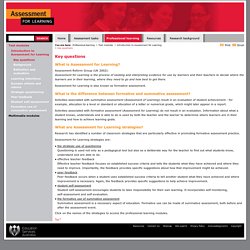
Assessment Reform Group (UK 2002):Assessment for Learning is the process of seeking and interpreting evidence for use by learners and their teachers to decide where the learners are in their learning, where they need to go and how best to get there. Assessment for Learning is also known as formative assessment. TeachingEnglish Jukebox. Song Activity Factory – The power of songs to teach English through innovative and engaging learning experiences. Free song-based lesson plans and activities with worksheet pdfs for ELT, ESL, EFL, TESOL, TEFL, EAL, ELL and ELA. 5 e-Learning Tips to Keep Younger Students Motivated. Advances in technology have begun to allow for a lot more freedom as a student.
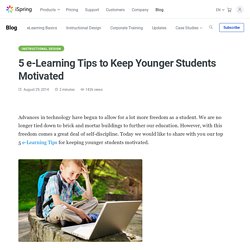
We are no longer tied down to brick and mortar buildings to further our education. However, with this freedom comes a great deal of self-discipline. Motivating the unmotivated. Getting teenagers to talk. Keep the conversation peer centred: plenty of pair or small group collaboration.Avoid asking discussion questions around the class: this puts them in the spotlight and causes potential embarrassment in front of friends.
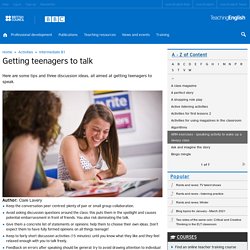
You also risk dominating the talk.Give them a concrete list of statements or opinions: help them to choose their own ideas. Getting teenagers talking. Why it's important Long-term and short-term memoryLanguage fitness & agilityAuthenticityWhy they don't use English Peer pressure Lack of motivation Lack of support How we can get students talking Explain why it's important Confidence tricks Attainable goals Conclusion Why it's important Long-term and short-term memory Theoretically, we retain information in two ways: In short-term and long-term storage.
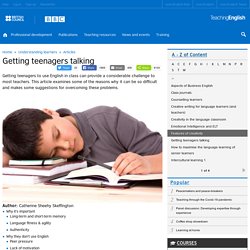
We transfer information from one to the other by convincing our brains that facts in the short-term memory are valuable enough to be put in long-term storage - otherwise, the information is discarded. Motivating speaking activities. At this age, the learners aren't motivated by new language, they're motivated by an activity.
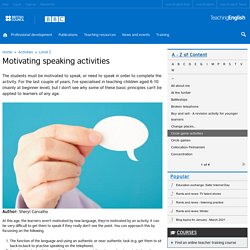
It can be very difficult to get them to speak if they really don't see the point. You can approach this by focussing on the following. The function of the language and using an authentic or near authentic task (e.g. get them to sit back-to-back to practise speaking on the telephone).A motivating task, which uses the language you want them to practise (e.g. students write questions on small squares of paper using the target language, then form the papers into a board game to be played using dice and counters).
Here are some possible examples, which apply to one or a combination of the above. A popular, well-known type of activity is the information gap. Making an arrangement: Each group has a diary, with appointments already filled in. Motivating pupils to read. This article describes ways to generate initial motivation, the second one shows how to maintain this motivation.
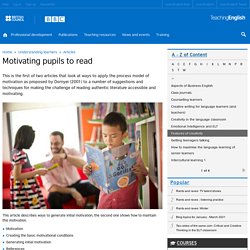
Motivation Creating the basic motivational conditions Generating initial motivation References Motivation Motivation is one of the key factors that determine the rate and success of L2 attainment. It provides the main incentive to initiate learning a foreign language and later the determination to persevere and sustain the long and often difficult learning process. Without sufficient motivation, even individuals with the best of abilities cannot accomplish long-term goals. Teachers working in state schools are first and foremost supposed to teach the curriculum, but we cannot ignore the fact that this cannot happen without motivating our learners.
Lesson plans. Lesson planning. Where do you start?
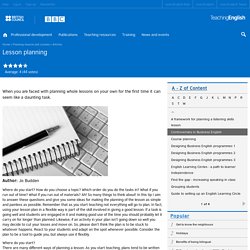
How do you choose a topic? Which order do you do the tasks in? How to Write a Lesson Plan: 5 Secrets of Writing Fantastic Lesson Plans. How Are Happiness and Learning Connected? As teachers, we also know that when students' affective filters or defenses are sky high, fight or flight responses will be modus operandi. Adapting materials for mixed ability classes. In these cases it’s important to remember that all students will get something out of the class, but not necessarily the same things, and not necessarily what you aim to teach them!
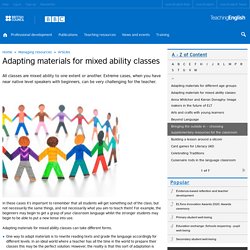
For example, the beginners may begin to get a grasp of your classroom language whilst the stronger students may begin to be able to put a new tense into use. Adapting materials for mixed ability classes can take different forms. One way to adapt materials is to rewrite reading texts and grade the language accordingly for different levels. In an ideal world where a teacher has all the time in the world to prepare their classes this may be the perfect solution. 10 Ways to Incorporate Student Choice in Your Classroom. My kids participate in an amazing hands-on learning experience every summer.
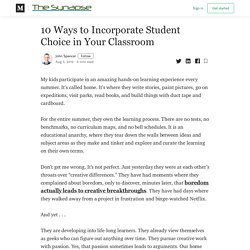
It’s called home. It’s where they write stories, paint pictures, go on expeditions, visit parks, read books, and build things with duct tape and cardboard. For the entire summer, they own the learning process. There are no tests, no benchmarks, no curriculum maps, and no bell schedules. It is an educational anarchy, where they tear down the walls between ideas and subject areas as they make and tinker and explore and curate the learning on their own terms.
We're the superhumans: Rio Paralympics 2016. Lyrics to Yes I Can. Original song by Sammy Davis Jr. Yes, I can, suddenly, yes, I can 'Gee, I'm afraid to go on' has turned into, 'Yes, I can' Take a look, what do you see? ELLLO - English Listening Lesson Library Online. Realia. Here are a few suggestions for activities using realia and to consider why we may want to bring things into the class. Why use realia in class? The main advantage of using real objects in the classroom is to make the learning experience more memorable for the learner. TeachingEnglish. TeachingEnglish. Katherine Bilsborough: Lesson plans – less is more.
You can travel without a list of course but you will avoid a few problems if you spend a bit of time planning – not a whole week though. That would be silly. A few minutes should be enough. Pre-empting problems will bring peace of mind and when it comes to teaching, this is a major defence against burnout and work stress. New teachers who have had training will have been evaluated and assessed on their lesson plans. They will spend hours preparing a 45-minute lesson. You can find lesson plan templates on the Internet too – that you can fill out yourself for your own classes.
More experienced teachers tend to spend less time on lesson planning. Welcome to CBeebies Grown-Ups.